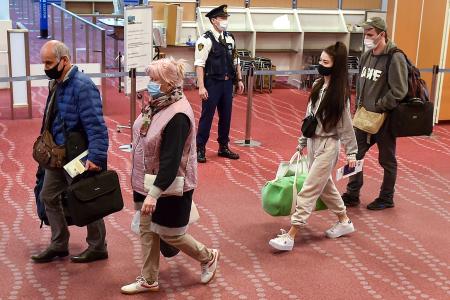
- ARAB NEWS
- 11 Jul 2025

TOKYO: The Japanese government plans to establish a new system at an early date in which people fleeing conflicts who do not qualify as refugees in the country can be protected under law as “quasi-refugees.”
The measure was included in a bill to amend the immigration control and refugee recognition law, which was scrapped last year. The government plans to submit the bill again to parliament after this summer’s House of Councillors election.
Under the UN Convention Relating to the Status of Refugees, a refugee is a foreign person who may face persecution “for reasons of race, religion, nationality, membership of a particular social group or political opinion.”
As such, the Japanese government takes the position that those who have fled conflicts between countries do not qualify as refugees. Those who have escaped the fighting in Ukraine have therefore been described instead as “evacuees.”
The government bill designates such people as being subject to “complementary protection,” enabling them to receive the same treatment afforded to refugees such as rights to permanent residence. A similar scheme is in place in European countries.
The scrapped bill would also have enabled Japan to forcibly send back aspiring refugees who have applied for three times or more, by creating an exemption to the rule that deportations be suspended during the refugee application process.
The policy, aimed at preventing the prolonged detainment of foreigners illegally staying in Japan, met resistance from opposition parties, which sought to have the measure removed from the bill.
The opposition parties also demanded that the government investigate the death of a Sri Lankan woman who died in detention at an immigration facility, resulting in the bill being abandoned.
The government is considering submitting the bill again, Chief Cabinet Secretary Hirokazu Matsuno told a press conference Tuesday. “We will make efforts to ensure that people who truly need protection are appropriately protected.”
The bill “needs to be enacted at any cost,” a senior Justice Ministry official said, signaling a sense of urgency added to the legislation by the war in Ukraine.
The largest opposition Constitutional Democratic Party of Japan remains steadfast in its call for the bill to be revised. “There are serious doubts about the immigration authorities’ handling (of the Sri Lankan woman),” Sumio Mabuchi, the CDP’s parliamentary affairs chief, told a press conference Wednesday.
But some opposition lawmakers are supportive of the bill. At a press conference, Fumitake Fujita, secretary-general of Nippon Ishin no Kai (Japan Innovation Party), sought to establish a legal system to protect people fleeing conflicts.
JIJI Press